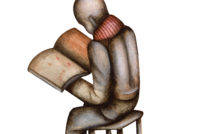
Needs of Mothers in the Criminal Justice System: Preliminary Findings from a Photovoice Study

This is part of our special feature on Crime and Punishment.
Parental involvement in the Criminal Justice System (CJS), and particularly parental imprisonment, has been associated with a myriad of negative outcomes for children, parents, and families (Miller, 2006). Children with a parent in the CJS are at an increased risk of developing social, emotional, and behavioural difficulties, having difficulties in school, engaging in delinquent behaviour, and entering the CJS themselves (Farrington et al, 2009). For Families, parental imprisonment increases the risk of financial hardship, residential instability, family breakdowns, as well as the risk of being stigmatized (Trotter, Flynn, & Baidawi, 2017). Maternal imprisonment has been linked to greater disruptions to children and families primarily because mothers are most likely to have been the sole caregiver to children prior to imprisonment (Mignon & Ransford, 2012).
Typically, the literature on this matter focuses exclusively on the impact of parental imprisonment on children and families, but rarely does it pay attention to the difficulties faced by parents in the CJS. However, from the small body of research available, we know that parents in the CJS are more likely than non-offending parents to have experienced a multitude of difficulties including mental health problems, substance abuse, a history of difficult interpersonal relationships, and to have been recipients of harsh parenting (Buston, Parkes, Thomson, Wight, & Fenton, 2011). Parental imprisonment can exacerbate many of the difficulties that these parents face. Mothers in the CJS may be particularly susceptible to stigma and mental health problems because of the social constructions surrounding motherhood. For example, Baroness Jean Corston argues that “many women still define themselves and are defined by others by their role in the family. It is an important component in our self-identity and self-esteem. To become a prisoner is almost by definition to become a bad mother.” (Corston, 2007, 20)
Parenting and Family Support Programs
Since the 1970s, there has been a growing interest regarding parenting and the impact it has on children’s social, emotional, and behavioral trajectories (Daly, 2013). This has stemmed in part from parents increased desire for information and advice about child-rearing (Smyth, 2012), but can also be linked to increasing concern over the health and wellbeing of children by people in public bodies (Daly, 2013). Indeed, since the 1990s, the UK government has made considerable and marked investments to establish a range of policies and practices aimed at improving outcomes for children by enhancing the knowledge and skills of parents (Kaminski, Valle, Filene, & Boyle, 2008).
Parenting and family support programs may have the potential to mitigate the effect of parental imprisonment and are currently being delivered in criminal justice settings across the world (Hoffman, Byrd, & kightlinger, 2010). For parents in prison, parenting programs have the potential to help parents build and/or maintain strong relationships whilst they are separated from their children and families. This is important because having strong family ties has been linked with better prisoner reintegration, reduced risk of recidivism, and better outcomes for children and families (Berg & Huebner, 2011; Mills & Codd, 2008; Sapouna, Bisset, & Conlong, 2011).
However, although there are a number of programs being rolled out to parents in the CJS, the empirical evidence base regarding their feasibility, appropriateness, meaningfulness, and effectiveness has only recently been synthesized and published (Troy et al. 2018). In general, research has focused on the efficacy of parenting programs rather than their feasibility, appropriateness, or meaningfulness. The evidence indicates that programs can improve parenting attitudes, parenting knowledge, and parental health and wellbeing, and furthermore, participation in programs may be associated with increased frequency of contact between parent and child. However, there is limited evidence regarding changes to parenting behavior, children’s behavior, or on indicators of children’s health and wellbeing. The review also highlighted barriers to the successful delivery of parenting programs in prisons, including the transient nature of the prison population and a lack of parent-child contact. Unfortunately, there is little knowledge regarding the feasibility, appropriateness, meaningfulness, and effectiveness of parenting programs delivered to parents who have recently been released from prison or parents serving community orders.
Very few studies have been undertaken with people who have first-hand experience of being a parent who is involved in the criminal justice system. Therefore, our understanding of the needs of parents, as perceived by them, is very limited.
“What’s Your Story?”
“What’s Your Story” was intended to fill this gap by working collaboratively with mothers in the CJS to understand and explore their perspectives in relation to their parenting and family support needs. In addition to investigating these needs, the aim of the study was to explore the mothers’ experiences of support, and to use this data to make recommendations that have the potential to inform the development and delivery of parenting and family support programs and services that are feasible, appropriate, meaningful, and effective.
“What’s Your Story” utilized a research method known as Photovoice (Wang, 1999). Photovoice is a visual arts method that has previously been used with a variety of groups whose voices are often absent from research due to their marginalization and disempowerment (Booth & Booth, 2003). For the purposes of this study, recruitment was conducted through a variety of criminal justice, social work, and third sector agencies in order to access mothers who had experience of prison and community payback orders. Participants were asked to generate photographs relating to their thoughts, feelings, and experiences of being a mother in the criminal justice system as well as their experiences of support. The photographs were then used as prompts to facilitate discussion in one-to-one interviews. Recruitment was extremely challenging and although 16 participants were identified as eligible for the study, only 7 completed the project.
Preliminary Findings
Parenting and Family Support Needs
The mothers in the study faced a myriad of difficulties and identified themselves as having one or a combination of the following: mental health difficulties; lack of positive relationships; a history of addiction or substance misuse; experience of homelessness; and experience of abuse and trauma either from parents or previous partners. Although some of the mothers in the study were self-critical of their parenting, they were all reluctant to seek or engage in a formal parenting program. Instead, the mothers described the need for support to overcome individual difficulties, particularly in relation to mental health. Alongside mental health support, the mothers identified practical support needs to help them gain access to benefits, training and jobs, and to assist them to work with professional bodies such as social work teams.
Mental health difficulties received most attention during the discussions. All but one of the mothers discussed having severe and enduring mental health difficulties that occurred prior to their involvement in the CJS. Mental health problems identified by the mothers included low self-esteem/self-worth, anxiety, depression, and borderline personality disorder. In addition, two of the mothers in the study described in detail attempts to take their own lives. Although mental health difficulties were apparent before CJS involvement, the difficulties seemed to be exacerbated by entry into the CJS, particularly for the mothers who had served prison sentences rather than community sentences.
Not only did imprisonment have a unique impact on the women’s mental health, it was also described as affecting the mothers parenting identities and capabilities. Mothers who had experienced prison spoke of the difficulties associated with separation and how this prevented them from maintaining a legitimate role in parenting. They also discussed what I have termed the visitation paradox, that is, the overwhelming joy of seeing their children and family, but the despair at having to say goodbye.
The majority of mothers in the study emphasized the need for positive relationships and acknowledged that good quality relationships can improve mental health and self-confidence. Those who had received support from family and friends highlighted the importance of having strong and stable support networks in place. However, the majority of mothers indicated that they had few, if any, positive adult friendships. The mothers in the study typically discussed fears about persuing new friendships and instead described a tendency to isolate themselves from the outside world and from people who they thought may be detrimental to their health and wellbeing and those who might present a risk to their desistance, sobriety, and custody battles.
Experience of Support
The mother’s experiences of support were mixed. In general, they described working with third sector and health care workers as positive, whereas experiences of working with social work professionals were regarded as poor. Third sector workers were described as flexible, and supportive with a genuine interest in helping the women. In contrast, the mothers voiced a number of concerns over the support provided by social work or CJS agencies and were suspicious of their underlying motives and the power which they had over their lives. In some cases, this prevented women from fully disclosing their difficulties and resulted in an unwillingness to engage with or receive advice and/or support from these workers.
The mother’s experiences of support indicate a number of potential facilitators and barriers to the uptake and engagement with support services. These can be mapped onto current theoretical knowledge from the implementation science literature (see Proctor et al, 2009), which highlight factors relating to the individual, the program, and the delivery context.
Individual Factors
Individual factors including perceived need and previous experiences of support are known to influence attitudes and behaviors. Many of the women did not perceive a need to engage in parenting programs and described them as intrusive. These attitudes are potential barriers to participation in parenting programs. The mothers in the study identified other areas where support would be beneficial therefore priority should be given to support mothers in these areas.
Program Factors
Program characteristics are also known to influence uptake and engagement in programs. Parenting and family support programs vary considerably in their theoretical underpinnings, content, delivery, and intensity. Programs can range from “a suite of resources and measures that aim to educate parents about child raining and, at the more interventionist end of the spectrum, engage them in activities that seek to change their approach to managing and controlling their children’s behavior” (Daly 2013, P.233). Based on the discussions it was evident that the mothers had sought information and support with their parenting but were reluctant to engage with programs which fell into the more interventionist spectrum. Fear of being judged as a bad parent was evident in the discussions and this could act as a barrier to engaging in formal parenting programs.
It was evident from the discussions that the mothers had attempted to access support for a variety of problems relating to their mental health, interpersonal relationships, addictions, and trauma. The mothers indicated a desire for these support programs to be flexible both in terms of content and logistics such as timing, location, and child care options.
Provider and Delivery Context
Provider characteristics and the delivery context are important considerations. The mothers in the study indicated that having an empathetic person who is knowledgeable about a range of topics, and who the mothers could trust was key for engagement. Findings from the Photovoice study indicate that mothers in the CJS may be most reluctant to receive parenting support from the social work department. Some of the mothers suggested that social workers may benefit from additional training regarding mental health needs of women in the CJS. They indicated that this type of training may result in social workers who are more empathetic to the needs of women in the CJS and this may in turn lead to less resistance from women in the CJS to work with them.
Conclusions
Although there are parenting programs currently being delivered within the CJS, more emphasis needs to be placed on addressing the holistic needs of the populations being targeted. Specifically, given the adversity faced by the majority of women involved with the CJS, it may be more prudent to address some of the wider issues they face rather than focusing exclusively on parenting. Moving forward, it is essential that when new programs are developed, key stakeholders are involved from the outset as this will ensure programs are meaningful and appropriate.
Victoria Troy is a PhD student at the School of Health and Life Science. Her PhD focuses on the parenting and family support needs of mothers in the Criminal Justice System (CJS). Her main research interests are in offending and the criminal justice system, substance use and misuse, and the impact of these topics on children and families. In addition to her PhD, she has completed an internship at the Scottish Government and is currently the PhD Ambassador for the Scottish Alcohol Research Network, Research Officer at Scottish Health Action on Alcohol Problems, and volunteer at the Scottish Centre of Crime and Justice Research.
Photo: Happy family silhouette on watercolor background | Shutterstock
References:
Berg, M. T., & Huebner, B. M. (2011). Reentry and the ties that bind: An examination of social ties, employment, and recidivism. Justice Quarterly, 28(2), 382-410.
Booth, T., & Booth, W. (2003). In the frame: Photovoice and mothers with learning difficulties. Disability & Society, 18(4), 431-442.
Buston, K., Parkes, A., Thomson, H., Wight, D., & Fenton, C. (2012). Parenting interventions for male young offenders: A review of the evidence on what works. Journal of Adolescence, 35(3), 731-742.
Corston, B. J. (2007). The Corston Report: A report of a review of women with particular vulnerabilities in the criminal justice system. Home Office.
Daly, M. (2013). Parenting support policies in Europe. Families, Relationships and Societies, 2(2), 159-174.
Farrington, D. P., Coid, J. W., & Murray, J. (2009). Family factors in the intergenerational transmission of offending. Criminal Behaviour and Mental Health, 19(2), 109-124.
Hoffmann, H. C., Byrd, A. L., & Kightlinger, A. M. (2010). Prison programs and services for incarcerated parents and their underage children: Results from a national survey of correctional facilities. The Prison Journal, 90(4), 397-416.
Kaminski, J. W., Valle, L. A., Filene, J. H., & Boyle, C. L. (2008). A meta-analytic review of components associated with parent training program effectiveness. Journal of Abnormal Child Psychology, 36(4), 567-589.
Mignon, S. I., & Ransford, P. (2012). Mothers in prison: Maintaining connections with children. Social Work in Public Health, 27(1-2), 69-88.
Miller, K. M. (2006). The impact of parental incarceration on children: An emerging need for effective interventions. Child and Adolescent Social Work Journal, 23(4), 472-486.
Mills, A., & Codd, H. (2008). Prisoners’ families and offender management: Mobilizing social capital. Probation Journal, 55(1), 9-24.
Proctor, E. K., Landsverk, J., Aarons, G., Chambers, D., Glisson, C., & Mittman, B. (2009). Implementation research in mental health services: an emerging science with conceptual, methodological, and training challenges. Administration and Policy in Mental Health and Mental Health Services Research, 36(1), 24-34.
Sapouna, M., Bisset, C., & Conlong, A. M. (2011). What Works to Reduce Reoffending: A Summary of the Evidence Justice Analytical Services Scottish Government.
Trotter, C., Flynn, C., & Baidawi, S. (2017). The impact of parental incarceration on children’s care: identifying good practice principles from the perspective of imprisoned primary carer parents. Child & Family Social Work, 22(2), 952-962.
Troy, V., McPherson, K. E., Emslie, C., & Gilchrist, E. (2018). The Feasibility, Appropriateness, Meaningfulness, and Effectiveness of Parenting and Family Support Programs Delivered in the Criminal Justice System: A Systematic Review. Journal of child and family studies, 27(6), 1732-1747.
Wang, C. C. (1999). Photovoice: A participatory action research strategy applied to women’s health. Journal of Women’s health, 8(2), 185-192.
Published on November 8, 2018.




